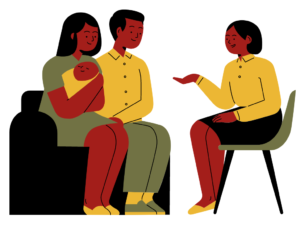Are you struggling with family issues that seem insurmountable? Do you find it challenging to communicate effectively with your loved ones, leading to conflicts that never seem to get resolved? If so, you’re not alone. Many families face these challenges, and the good news is that help is readily available. In this article, we will explore the role of a family therapist, how to find one near you, and why seeking their expertise can be a game-changer for your family dynamics.
Contents
The Role of a Family Therapist
The role of a family therapist is multifaceted and involves various responsibilities aimed at helping families address and resolve their issues, improve communication, and enhance their overall well-being. Here are some of the key roles and responsibilities of a family therapist:
- Assessment: Family therapists begin by conducting comprehensive assessments to understand the family’s dynamics, relationships, and the issues they are facing. This may involve individual interviews with family members, observation of family interactions, and the use of assessment tools to gather information.
- Diagnosis: Based on their assessment, family therapists diagnose the underlying problems and challenges within the family system. This involves identifying patterns of behavior, communication issues, and emotional dynamics that contribute to family difficulties.
- Treatment Planning: Family therapists work with the family to develop a treatment plan tailored to their specific needs and goals. The treatment plan outlines the therapeutic approach, goals, and strategies for addressing the identified issues.
- Communication Facilitation: One of the primary roles of a family therapist is to improve communication within the family. They help family members express themselves more effectively, listen to each other, and understand each other’s perspectives.
- Conflict Resolution: Family therapists assist families in identifying and resolving conflicts and disagreements constructively and healthily. They teach conflict resolution skills and help family members find common ground.
- Education and Psychoeducation: Family therapists provide information and psychoeducation to families about mental health issues, family dynamics, and effective parenting strategies. They may also teach coping skills and stress management techniques.
- Support and Empowerment: Family therapists offer emotional support and empowerment to family members. They help families build resilience, develop problem-solving skills, and increase their self-esteem and self-efficacy.
Why Family Therapy Is Important

Family therapy is important for several reasons, as it offers numerous benefits to individuals and families dealing with a wide range of issues and challenges. Here are some of the key reasons why family therapy is considered important:
- Improved Communication: Family therapy focuses on enhancing communication skills within the family. Improved communication can lead to better understanding, reduced conflicts, and more effective problem-solving.
- Conflict Resolution: Families often experience conflicts and disagreements. Family therapy provides a safe and structured environment for addressing these conflicts and finding constructive solutions.
- Relationship Strengthening: It helps strengthen the bonds and relationships among family members. This can be especially important during times of crisis or when family members are drifting apart.
- Understanding Family Dynamics: Family therapists are trained to identify and analyze family dynamics and patterns of behavior. Understanding these dynamics is crucial for making positive changes within the family.
- Support During Transitions: Family therapy can be valuable during major life transitions, such as divorce, remarriage, the birth of a child, or the death of a loved one. It helps families adapt to changes and challenges.
- Parenting Support: Family therapy can provide parents with guidance and support in dealing with behavioral issues in children and adolescents. It can also help parents develop effective parenting strategies.
How to Find Family Therapists Near You?
Finding a family therapist near you involves several steps to help you locate a qualified and suitable therapist who can address your specific needs. Here’s a step-by-step guide on how to find family therapists in your area:
- Determine Your Needs: Before you start searching for a family therapist, it’s important to clarify your needs and goals. What issues are you facing as a family, and what do you hope to achieve through therapy? Understanding your goals will help you find a therapist who specializes in the relevant areas.
- Ask for Recommendations: Reach out to friends, family members, or acquaintances who may have experience with family therapy. They may be able to recommend a therapist they trust.
- Check with Your Insurance: If you have health insurance, contact your insurance provider to inquire about in-network therapists. This can help you narrow down your options and potentially reduce your out-of-pocket expenses.
- Contact Local Mental Health Centers or Clinics: Local mental health centers, community clinics, or hospitals may have family therapists on staff or can provide referrals to qualified therapists in your area.
- Contact Therapists: Reach out to therapists on your list to inquire about their availability, fees, and whether they offer a free initial consultation. During this consultation, you can ask questions to assess whether they are a good fit for your family.
- Ask Questions: When speaking with potential therapists, ask about their therapeutic approach, experience with the specific issues you’re facing, and their availability for sessions. It’s important to find a therapist who aligns with your goals and values.
Qualities to Look for in a Family Therapist

Choosing the right family therapist is a crucial decision, as the therapeutic relationship plays a significant role in the success of family therapy. Here are some qualities and characteristics to look for when selecting a family therapist:
- Licensed and Qualified: Ensure that the therapist is licensed and accredited in your state or country. This ensures they have the necessary training and credentials to provide therapy services.
- Experience and Expertise: Look for a therapist who has experience in family therapy and specializes in the specific issues your family is facing. Family therapy can vary widely, so finding a therapist with relevant experience is important.
- Good Communication Skills: Effective communication is at the heart of family therapy. Your therapist should be an excellent communicator who can facilitate productive conversations within your family.
- Empathy and Compassion: A good family therapist should demonstrate empathy and compassion toward all family members. They should be able to understand and validate the feelings and perspectives of each family member.
- Non-Judgmental Attitude: A non-judgmental and accepting attitude is essential in family therapy. Therapists should create a safe and supportive environment where family members feel free to express themselves without fear of judgment.
- Cultural Competence: If your family has a specific cultural background, look for a therapist who is culturally competent and sensitive to your cultural values and beliefs. Cultural understanding can enhance the effectiveness of therapy.
- Flexibility and Adaptability: Family therapy can be dynamic, with unexpected issues arising during sessions. A good therapist should be flexible and adaptable, able to adjust their approach as needed.
What to Expect in Family Therapist Sessions?

Here are some common elements and expectations you can generally anticipate in family therapy sessions:
- Initial Assessment: The first session is often an assessment or intake session. The therapist will ask questions to understand your family’s background, dynamics, and the issues you’re facing. This is an opportunity for you to share your concerns and goals for therapy.
- Establishing Goals: In collaboration with the therapist, you’ll identify specific goals for therapy. These goals can be related to improving communication, resolving conflicts, addressing specific issues (e.g., substance abuse, parenting challenges), or achieving other desired outcomes.
- Family Participation: Family therapy involves all family members who are willing and able to participate. This may include parents, children, siblings, and other significant individuals. The therapist will work to create a safe space where everyone can contribute.
- Open Dialogue: Family therapy emphasizes open and honest communication. Sessions often involve discussions where family members express their thoughts, feelings, and concerns. The therapist may facilitate these conversations to ensure that they are productive and respectful.
- Problem-Solving: Therapists help families identify and address specific problems or challenges. They may use problem-solving techniques to explore potential solutions and strategies for improvement.
- Teaching Skills: Family therapists often teach communication skills, conflict resolution techniques, and coping strategies. These skills are intended to help family members interact more effectively and manage stressors.
Different Approaches by Family Therapists

The choice of approach depends on the therapist’s training, the specific needs of the family, and the therapist’s assessment of what will be most effective. Here are some different approaches commonly used by family therapists:
- Structural Therapy: This approach, developed by Salvador Minuchin, focuses on the family structure and how family members relate to each other. Therapists help families reorganize their structure to improve communication and resolve conflicts. The therapist may take an active role in restructuring interactions.
- Strategic Therapy: Strategic family therapy, developed by Jay Haley and others, is goal-oriented and solution-focused. Therapists identify and prescribe specific interventions to address problems. They may assign tasks or give directives to family members to bring about change.
- Systemic Therapy: Systemic therapy views problems within the context of the family system. Therapists help families understand how their dynamics contribute to issues. They emphasize circular causality, exploring how each family member’s behavior influences and is influenced by others.
- Narrative Therapy: Narrative therapy, developed by Michael White and David Epston, focuses on the stories and narratives that families construct about their lives. Therapists help families reframe their stories and view problems from different perspectives, empowering them to change their narratives.
- Communication Therapy: This approach concentrates on improving communication patterns within the family. Therapists teach effective communication skills, active listening, and assertiveness to help family members express themselves more clearly and understand each other better.
Conclusion
In this article, we’ve explored the role of family therapists, how to find one near you, and why seeking their expertise can be a game-changer for your family dynamics. Whether you’re facing communication issues, conflicts, or other challenges, family therapy offers a path to a healthier and more harmonious family life. If you’re ready to take the first step towards positive change, get in touch with a qualified family therapist today.
Online therapists are increasingly important in today’s world because they provide a convenient and accessible way for people to receive mental health support and treatment. Visit TherapyMantra for an affordable Online Therapy: Book a trial Online therapy session.
.


